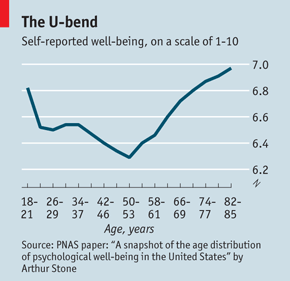Your happiness explained in plumbing terms

When I embarked upon middle age and all the things that come with it – the kids, the husband, the career ambitions, the untrainable pets and interminable housework – my mother said to me, “Welcome to the most hectic period of your life.”
What I realise now is that she was actually saying, “Welcome to the slippery slide into the most challenging and unhappy part of your life. Good luck.”
Because, in happiness terms, middle age is a valley of darkness, and my mother, spritely, fit, adored by grandchildren and not giving a hoot what anyone thought of her, was standing on the hill at the other side, and the only way for her was up.
Believe it or not, this little tale has a standing in economic research, and it is a phenomenon that occurs all around the world, regardless of race, religion, wealth or situation.
It’s known as the “U-bend of life”.
Andrew Oswald, professor of economics at Warwick Business School, says the U-bend was first observed in the early 1990s. But it wasn’t until the science of happiness became popular a decade later that the theory gained any traction.
Generally speaking, we all start off adulthood reasonably happy. Studies have shown that most people in their 20s and early 30s are relatively carefree and upbeat. Come the middle ages, however, and things take a sharp turn south. Happiness levels bottom out for a while, often leading to that well-known crisis point.
At some point, whether you’re in Japan, Denmark, Bhutan or Bahrain, research has shown that most people lift themselves out of the doldrums and their happiness levels start to climb.
In other words, If you were plot people’s happiness on a graph, the line would create a shape that looks a little like the U-bend under your sink (only less clogged with hair, one would hope).
Like a rat up a drainpipe
The average global age people’s happiness bottoms out is 46 according to international research by David Blanchflower, professor of economics at Dartmouth College, with discontent lasting the longest for Ukrainians, who are miserable until they are 62, and those perky Swiss hitting their nadir at 35.
For most of us, our 40s and early 50s are our unhappiest years, and then, magically, things get better.
The coolest thing about this U-bend theory is that it applies to people all over to world, in very different cultures. Americans and Zimbabweans have far different life experiences, yet both are happier from the mid-50s.
Some theories on the unhappiness of middle age include the scourge of teenage children or the stress of ageing parents. But who cares? Those days are over!
And don’t think older people are happier because they finally have their cash all to themselves, when researchers strip away the money factor, the U-bend still applies, same goes for taking employment status and children or grandchildren out of the equation.
So the growing happiness that follows middle-aged misery must be the result not of external circumstances but of internal changes.
Studies have shown that people behave differently as they age. We can all think of someone who has “mellowed out as they got older”, right?
Older people have fewer rows and come up with better solutions to conflict. They are better at controlling their emotions, better at accepting misfortune and less prone to anger.
Is this because we know which battles are worth fighting? Or that we recognise that life really is too short to waste our energies on these negatives? Is it the levelling effect of seeing our friends around us grow sick, old, or pass away?
Maybe we just come to accept our strengths and weaknesses, and give up on certain dreams, only to realise that chasing them was no fun.
The ageing population is often seen as a burden on the economy and a problem to be solved. The U-bend argues for a more positive view of the matter. As the Economist says, “The greyer the world gets, the brighter it becomes!”
Do you feel happier now than you did during your 40s and 50s? What makes you happy right now?









 Proudly Australian owned and operated
Proudly Australian owned and operated